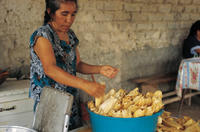 Katrina’s Victims and the Minimum Wage
Katrina’s Victims and the Minimum WageBy Jeff Chapman
Economic Policy Institute
News coverage of Katrina’s impact has raised public awareness of the especially harsh devastation the storm wrought for the many low-income families in its path, who now face the Herculean task of rebuilding their lives. At the same time, it has offered an important insight into the struggles that low-income families everywhere have to make ends meet.
One major contributor to these families’ hardships, wherever they make their home, has been the failure of Congress and the administration to make sure that the minimum wage keeps up with the rising cost of living. The federal minimum wage, which has stayed at $5.15 since it was last raised in 1996-1997, has less purchasing power now than it did in 49 of the last 50 years.
A proposal in Congress earlier this year would have raised the federal minimum wage to $7.25 an hour. If Congress had acted on it, this increase would have directly benefited 491,000 workers in Alabama, Mississippi, and Louisiana who are currently paid less than that amount. African-Americans, who are 27.5 percent of the total workforce, make up 45 percent of these 491,000 lowest- paid workers. The 491,000 workers are parents of about 310,000 children.
Another 356,000 workers earn less than $8.25 per hour - $1 more than what the new minimum wage would have been. Various studies of "spillover effects" find that many in this group would also have benefited from the rising tide created by a minimum wage increase. African-Americans make up 36 percent of this group. Workers in this group are the parents of about 206,000 children.
Jeff Chapman is an economist at the Economic Policy Institute. He provided all of the calculations referred to in this report. The Economic Policy Institute is an independent, nonprofit, nonpartisan research institute – or “think tank” – that researches the impact of economic trends and policies on working people in the United States and around the world.
Tags: Economy, Labor, Minimum Wage, Public Policy, Business, Hurricane Katrina
2 comments:
I come from a village situated on the bank of river Jhelum, which spills out of its banks almost every year. Once, after the flood, I saw an old lady sitting on the heap of his home stuff tat was recovered from the flood. She was crying and sifting things. Her young daughter was helping her. She said, "I am not crying over the sack of sugar that was kept for your marriage reception, I am also not crying on the gold necklace that was to be worn to you on the day of your marriage. . . I am crying that I need another life time to make all those things to marry you."
Do you find the relevance here?
Shirazi, there is much relevance here. I think the woman in your village could very well be one of the families affected by Katrina. Thank you for your post.
Post a Comment